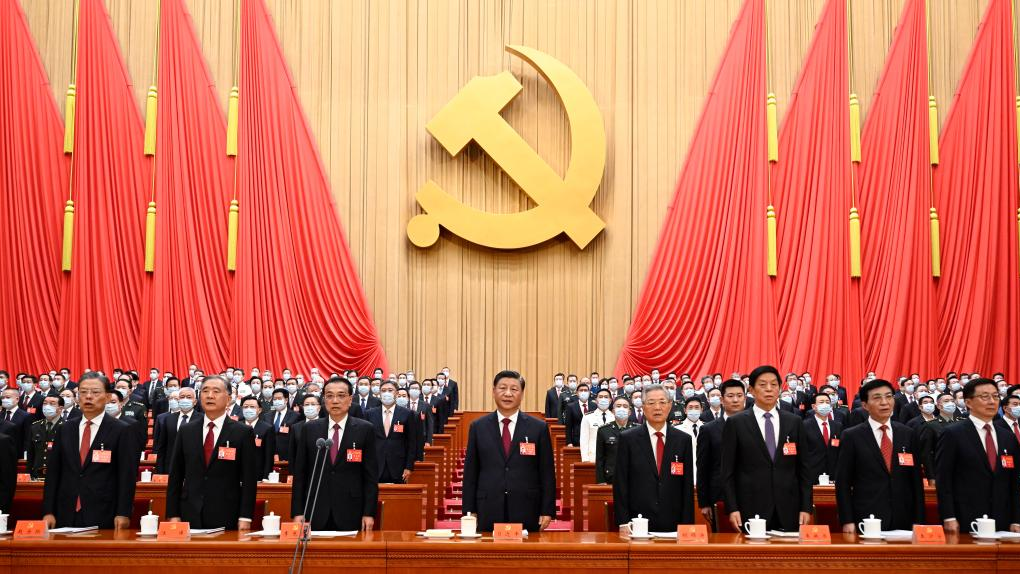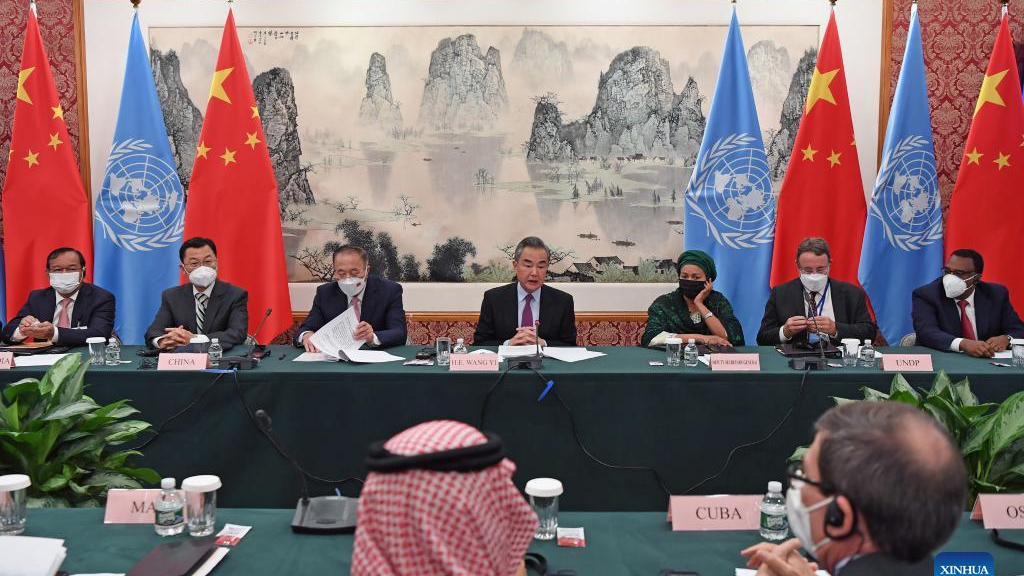
Xi Jinping, Li Keqiang, Li Zhanshu, Wang Yang, Wang Huning, Zhao Leji, Han Zheng and Hu Jintao attend the opening session of the 20th CPC National Congress at the Great Hall of the People in Beijing, capital of China, October 16, 2022. /Xinhua
Xi Jinping, Li Keqiang, Li Zhanshu, Wang Yang, Wang Huning, Zhao Leji, Han Zheng and Hu Jintao attend the opening session of the 20th CPC National Congress at the Great Hall of the People in Beijing, capital of China, October 16, 2022. /Xinhua
Editor's note: Xin Ge is an associate professor at the School of Public Economics and Administration, Shanghai University of Finance and Economics. The article reflects the author's opinions and not necessarily the views of CGTN.
The 20th National Congress of the Communist Party of China (CPC) opened in Beijing on October 16. Apart from the highly-anticipated blueprint for China's domestic development over the next five years and beyond, China's foreign policy and its answers to global challenges are also of great significance to the world.
As Xi Jinping, General Secretary of the CPC Central Committee, stressed in his report to the Party Congress, China works to enhance coordination and positive interaction with other major countries to build relations featuring peaceful coexistence, overall stability and balanced development.
What stands out as an example of China's efforts to advance global development is the Global Development Initiative (GDI) put forward by Xi a year ago. As the Foreign Ministry spokesperson Wang Wenbin put it at a regular press conference in Beijing on October 19, 2022, the one-year-old GDI demonstrates that China is contributing its solutions to tackling global governance deficits and other global challenges, serving as an accelerator of the UN's 2030 Agenda for Sustainable Development.
Xi first introduced the GDI in a virtual address to the UN General Assembly on September 21, 2021, in response to the worldwide setbacks caused by the COVID-19 pandemic. As Xi pledged in his statement, "We must revitalize the economy and pursue more robust, greener and more balanced global development."
Being a primary endeavor to help accelerate the momentum for the UN 2030 Agenda for Sustainable Development, priority areas for the GDI include poverty reduction, food security, COVID-19 vaccines, financing for development, climate change and green development, industrialization, the digital economy, and connectivity, while sticking to six accompanying principles – a people-centered approach, development as a priority, benefits for all, innovation-driven development, harmony with nature, and action-oriented approaches. It is apparent that the initiative is committed to bridging the Global North the South gap and eradicating inequality between countries.
The GDI has been warmly received by the international community since its inception. More than 100 countries and international organizations have voiced their support for the initiative, while over 60 have joined the Group of Friends of the GDI launched by China at the UN in January 2022.

Chinese State Councilor and Foreign Minister Wang Yi chairs the Ministerial Meeting of the Group of Friends of the Global Development Initiative in New York, U.S., September 20, 2022. /Xinhua
Chinese State Councilor and Foreign Minister Wang Yi chairs the Ministerial Meeting of the Group of Friends of the Global Development Initiative in New York, U.S., September 20, 2022. /Xinhua
China and these international partners have together built networks for multilateral cooperation in areas such as agriculture, education, counter-COVID-19 policies and climate change, and more importantly, two financing platforms – the Global Development and South-South Cooperation Fund, and the third phase of the China-UN FAO Trust Fund for South-South Cooperation.
Just a month ago on September 21, 2022, at the Ministerial Meeting of the Groups of Friends of the GDI, held on the sidelines of the UN General Assembly session in New York, Chinese Foreign Minister Wang Yi further announced seven practical measures and released the first list of the GDI project pool, including 50 concrete cooperation projects and 1000 more capacity building projects.
China's proposal to the GDI is certainly a timely initiative to counter worldwide development setbacks. Almost three years into the global pandemic, we have witnessed millions of lives lost and severe unprecedented socio-economic impacts.
Domestic and international conflicts, climate change, growing inflation and economic downturn, rising poverty and hunger, energy crises, and all these structured inequalities between and within countries have got worse. This global public health crisis has threatened decades of world development gains, hampering the efforts on transition to greener and more inclusive economies. Recovery endeavors have been implemented; however, they were far from even, fair and sufficient for global sustainable development.
As the UN Secretary-General Antonio Guterres pointed out, the world has moved off the track in meeting the deadline of achieving the Sustainable Development Goals (SDGs) by 2030; and the GDI is "a promising response to help the world recover from recent setbacks and accelerate the achievement of the SDGs worldwide."
China has become an active pioneer and builder of world peace and an indispensable driver in shaping a more equitable and effective global governance. The launch and promotion of the GDI by no means suggest the diminishing of another well-known China-proposed initiative – the Belt and Road Initiative (BRI). They developed along parallel tracks. While the BRI is more economic growth and hardware oriented, the GDI is more social development and software oriented. The BRI focuses on infrastructure, economic corridors and trade, whereas the GDI centers on people's livelihoods, knowledge transfer and capacity building.
The Global Development Initiative is anchored on the principle that "No country and no one should be left behind." Given the world's continuing volatility, we will see how China's stability and consistency in defending true multilateralism can become a geo-economic and geo-political ballast, contributing to international cooperation, global governance and world peace.
(If you want to contribute and have specific expertise, please contact us at opinions@cgtn.com. Follow @thouse_opinions on Twitter to discover the latest commentaries in the CGTN Opinion Section.)